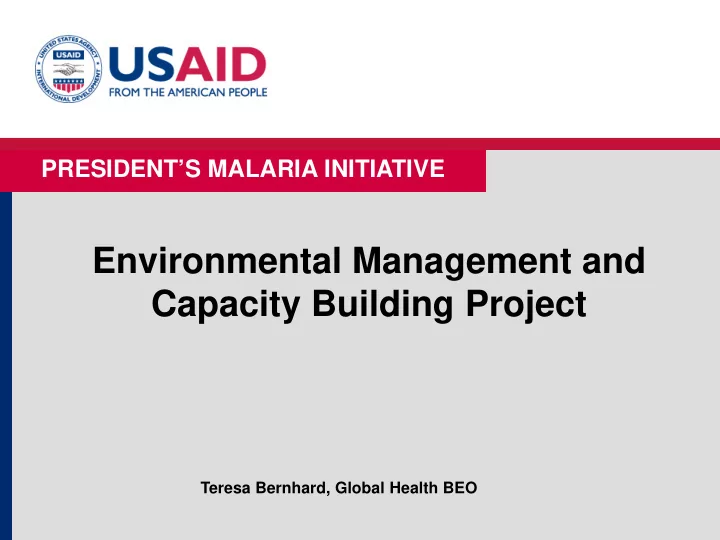

PRESIDENT’S MALARIA INITIATIVE Environmental Management and Capacity Building Project Teresa Bernhard, Global Health BEO
WHY EMCAB? • Field of environmental health and safety in the context of vector control is relatively new. • Regulation 216 requires that USAID ensure that environmental factors and values are integrated into the USAID decision-making process. • Massive scale-up of both IRS operations and LLIN distribution requires detailed attention to environmental compliance.
IRS Programs have been Implemented by PMI Partners in some Target Countries for over Two Years EMCAB 101 •Centrally funded project during the first year (three year contract) • Field visits to PMI priority countries •Best practices review • EMCAB will fully utilize lessons learned from Past and Ongoing PMI IRS programming Photo by Autman Tembo, RTI • EMCAB will focus on adding value to existing IRS programs supported by USAID • EMCAB will identify practical opportunities and approaches for mitigating potential risks •Dissemination of these best practices •Capacity building/training opportunities Photo by Marshall Fischer, IRG Photo by Marshall Fischer, IRG Photo by Autman Tembo, RTI
Illustrative Areas for Possible Best Practices Training Planning • Development of video training aids • Quantification of pesticides to support IRS campaigns • Inter-jurisdictional (ministerial) coordination agreements Implementation • Enhancements to applicator training Procurement • Drift recognition and management issues • MSDS Guidance – (Model after ANSI MSDS Guidance) – • Use of countercurrent rinse systems to minimize waste Assure full disclosure of critical information on storage, water generation clean-up, disposal, etc. from manufacture. • Improved management of PPE and uniform cleaning • Product packaging requirements to improve inventory management/ accounting and to minimize waste generation • Design considerations for effective evaporation basin operations • Product testing protocols to verify chemical quality – prevent • Collection, storage and disposal of highly contaminated substandard product shipped and becoming waste waste • Collection, storage and disposal of low level contaminated Supply Chain Logistics wastes • Chemical inventory practices • Use manifest for chemical transfers – prevent leakage to non Monitoring and Evaluation target sector (e.g., leakage to agriculture sector) Characterization of waste types generated by the IRS • Guidance on any intermediary formulation of IRS chemicals process Corrective measures Storage and Security Removal and disposal of contaminated soils • Warehousing and fire safety (e.g., NFPA Standard 434) Oversight Management • Signage General Role of Environmental Jurisdictions in IRS processes • Use of proper PPE and emergency response procedures
Depending on country needs EMCAB could: Activity 1. Provide technical support to USAID operating units in environmental compliance assurance of indoor residential spraying (IRS) activities Activity 2. Provide technical support to USAID operating units in environmental compliance assurance of ITNs Activity 3. Monitor additional environmental mitigation measures when DDT is procured and/or used for IRS Activity 4. Examine evidence of non-compliance Activity 5. Under the direction of PMI team members, facilitate collaboration with communities and relevant Ministries (Environment, Health, Agriculture, and others as appropriate in the host country), and ensure compliance with host-country environmental regulations Activity 6. Perform periodic review of implementation of IRS operations
Key Elements of Our Approach With significant and rapid expansion of the PMI program from coverage of 2 million people in 2006 to 17 million •Collaborative work plan development with USAID/GH in 2007, there will be a need to apply lessons learned and missions and best practices from the existing program to the expanded program. This is a field in which IRG excels •Flexible and specifically-designed teams to meet the and on which we have worked very closely with USAID needs of individual missions and host countries in the environment and economic growth fields. •Robust KM system to archive databases and IRG Team documents and permit ready access to them by stakeholders • Marshall Fisher, Chief of Party • •Multi-sectoral approach to policy and institutional Alan Schroeder, Pesticide reform based on proven approaches Management Specialist • Jim Tarrant, HO Project Manager IRG brings an integrated and highly participatory approach to environmental monitoring and capacity building for malaria vector control interventions. Having USAID Team worked on the Programmatic Environmental Assessment (PEA) Integrated Vector Management • Andrea Sternberg, Project Manager programs, we are very familiar with the technical • Elissa Beerbohm, Project Manager requirements for field monitoring and documentation on • Teresa Bernhand, Technical Resource compliance with the actions plans of the PERSUAPS of each country’s program as well as the need for capacity building at both the USAID Mission and host country institution level to achieve long-term sustainability.
Recommend
More recommend